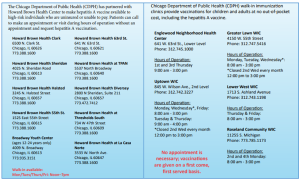Hepatitis A - HAN
Jump To:
Overview
Chicago Department of Public Health (CDPH) managed a small cluster of cases in late 2017 and reported on an increase in activity among men who have sex with men (MSM) (see February 1, 2018 health alert) and continues to monitor reports of hepatitis A closely given the rapid growth of outbreaks across the country (updated case counts per CDC).
Symptoms: Symptoms include a viral prodrome of fatigue, malaise, fever, muscle aches, followed by nausea, vomiting, diarrhea (more common in children), abdominal pain and hepatitis (elevated serum aminotransferase levels) which can be associated with darkening of urine, pale-colored stools, and yellowing of the skin (jaundice) and/or eyes (scleral icterus).
The most common symptom in adults is jaundice (>70%). Transmission occurs by fecal-oral route. Liver failure and death are more likely to occur in persons over the age of 50 years and those with chronic liver disease.
Prevention: In order to protect Chicago’s highest risk individuals, CDPH is asking all adult healthcare providers to vaccinate the following high risk groups:
-
Homelessness or transient housing
-
Men who have sex with men (MSM)
-
Persons who use drugs (injection or non-injection)
-
Persons with a history of incarceration
-
Persons with chronic liver disease
-
Persons living with HIV
-
Travelers
-
Persons with clotting-factor disorders
-
Persons who work with non-human primates
-
Persons who anticipate close personal contact with an international adoptee
Information for Providers
CDC Acute Hepatitis A Case Definition, 2019
Have a low threshold to report clinical suspicion for Hepatitis A in high-risk individuals.
If you are in the Emergency Department (ED) and have clinical suspicion for hepatitis A in a high-risk individual, use the Hepatitis A ED reporting form.
Given national outbreaks, vaccinate all high-risk patients for Hepatitis A now. Consider repeating non-reactive (NR) IgM results in one week for clinically consistent cases.
For clinical questions, please call the CDPH Provider Reportable Disease Hotline: 312-743-9000.
Information For Vaccinators
Resources for Vaccinators
Hepatitis A Patient Evaluation and Management for ED and Outpatient Providers
Hepatitis A Vaccination - Information for Providers
Emergency Department Hepatitis A Vaccination Program FAQ
Standing Orders for Administering Hepatitis A Vaccine to Adults
Hepatitis A Vaccine Information Statement (VIS)
Manufacturer’s Vaccine Assistance Program
Merck Vaccine Patient Assistance Program provides vaccine for uninsured adults (19 years or older). Call 1-800-293-3881 from 7:00 a.m. to 7:00 p.m. CST, Monday through Friday or click here.
Hepatitis A Vaccine Locations in Chicago
Hepatitis A vaccine is available and provided by Howard Brown Health Center and CDPH Immunization Clinics.

Hepatitis A Across the State of Illinois (IDPH)

Hepatitis A Case Counts in the United States (CDC)
As of February 22, 2020:

Hepatitis A Update
Chicago Hepatitis A Case Data
(September 2018 - December 2019)
Outbreak-Related Cases |
54 |
Hospitalizations |
41 (75.9%) |
Deaths |
0 |
Last Updated: February 14, 2020
Chicago Hepatitis A Task Force (CHART) Newsletters
- March 2023 Edition
- May 2022 Edition
- December 2021 Edition
- July 2020 Edition
- Feburary 2020 Edition
- July 2019 Edition
- April 2019 Edition
- November 2019 Edition

Information For Providers And Patients
Educational Materials
Fact Sheets
CDC General Hepatitis A (English)
CDPH General Hepatitis A (English) (Spanish)
CDC Viral Hepatitis Information for Gay and Bisexual Men (English)
Hepatitis A for Volunteers with Direct Contact with High-Risk Groups (English)
Hepatitis A for Food Handlers (English)
Hepatitis A Disinfection Tip Sheet (English)
Posters
Why Should You Care About Hepatitis A? - English
Porque Debe Importarle La Hepatitis A? - Spanish
TouchCards
CDPH Hepatitis A Health Alerts
CDPH Health Alerts Archive
Guidance for ED Physicians to Prevent Further Spread of Hepatitis A in Chicago – December 7, 2019
Return of Outbreak-Associated Hepatitis A virus (HAV) to Chicago – March 26, 2019
Increase in Hepatitis A Activity in East-Central Illinois – December 7, 2018
Increase in Hepatitis A among Men Who Have Sex with Men (MSM) – February 1, 2018
Hepatitis-A Reporting
For Clinical Questions or to Report Suspect Cases, Contact:
The CDPH Disease Reporting Hotline at
312-743-9000
*After hours, weekends, and holidays, call 311 and ask for the communicable disease physician on-call (or 312-744-5000 if outside the City of Chicago)
Per the Control of the Communicable Disease Code of Illinois, Hepatitis A cases must be reported to CDPH within 24 hours.
Case Report Form (preferred)
Communicable Disease Hepatitis Surveillance
312-746-6388 (Fax)
If your organization would like to:
- Receive Hepatitis A vaccine to administer to Chicago’s high-risk populations, please email ChicagoVFC@cityofchicago.org or call 312-746-5382.
- Distribute hygiene kits to homeless individuals, please contact Donovan Robinson at 312-746-6286.
- Return Hepatitis A vaccine that is expiring soon or you do not plan to use, please email ChicagoVFC@cityofchicago.org.
Laboratory Testing
Please save all reactive Hepatitis A IgM specimens for 30 days. View CDC’s Letter Re: Submission of Patient Specimens to CDC for Hepatitis A Testing (April 26, 2019) for further guidance.
Hepatis-A Contacts
CDPH Provider Disease Reporting Hotline
Communicable Disease Hepatitis Surveillance
312-743-9000 (Phone), 312-746-6388 (Fax)
